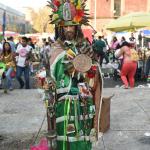
Authored by guest contributor Dr. Kate Kingsbury*
Early Christianity featured exorcism at its fulcrum. Deliverance from the devil was the preserve of holy individuals living and dead, with no particular formalities attached. In the Medieval ages, exorcisms became more indirect, frequently exorcised objects such as salt, oil and water were utilised. Later, the exceptional holiness of saints and their shrines, as miracle workers, began to take precedence over actual exorcisms. As the Middle Ages rolled on exorcism became a marginal activity and morphed from a charismatic, ecstatic practice to a liturgical rite invoking priestly authoritas.
During the Reformation and Counter-reformation, as the Catholic Church battled with Protestant attacks and internal divisions its practices came under the spotlight. As a result, exorcism was reclassified and subjected to rigorous methods as the Church sought to establish a strict criteria of diagnosis and canonical legitimacy. Legality came to the fore, as questions arose of who had the authority and legitimacy to exorcise, the Catholic Church began to censor who could perform exorcisms and how. It is during this time, in the 17th century, that the practices were defined and the rite utilised today is an adaptation of that conceived of during this era. Although exorcism was increasingly unpopular, Satan reared his horned head again quite dramatically as the schisms between Christian groups during the Reformation were conceptualised as an ‘apocalyptic conflict between the Church of God and the Synagogue of Satan’ (Young 2016:30) and demand continued in some pockets of the Western world.
But with the so-called Age of Reason, defined by scientific advancements, rationalism, scepticism and a secular state, exorcism again, came under attack. Even within the Church itself Catholic intellectuals such as Blaise Pascal, who combined a fideistic perspective on theology with openness to science, propagated a negative view of the topic. Exorcism manuals, exorcism 101, a how-to guide, which formerly circulated freely were suppressed and despite demand from the lay people we began to see the obsolescence of exorcism.
In the 19th and 20th centuries as modern medicine and psychology advanced, exorcism was further ridiculed and neurological and psychological explanations, such as hysteria and epilepsy, were proffered for why people appeared to be possessed. The Return of the Age of Exorcism was witnessed dramatically in the 1970s. The box office hit, The Exorcist, which in 1973 grossed $441.3 million revealed the importance and still cogent belief in demonic possession and the need to deliver tormented souls from evil spirits. So why was it in the 70s that we witness this recrudescence? Ironically, the Protestant church that had formed part of the impetus during the Reformation to reign in exorcisms, which were seen as evidence of pagan influences, was the same church that resurrected interest in exorcism in Christianity as a whole, and within the Catholic Church.
As of the last few decades it is clear that we are witnessing a recrudescence in the demand for exorcisms. It is for this reason that Pope Francis, who regularly denounces the devil, recently endorsed exorcism urging priests to have no sympathy for the devil and his legions and to use exorcists if they hear confessions indicating of or see behaviour indicating satanic activity. Just a few months into his pioneering pontificate, in 2013, the Argentine pope himself performed an informal exorcism on a young man in a wheel chair who had been brought to see the pontiff by a Mexican priest who presented him as demon-possessed. The Pope intently laid two hands upon the young man’s head clearly concentrating on driving out the demons. In the same vein, the Vatican organised an exorcism workshop this April in Rome, over 250 priests from 51 countries assembled to learn the latest and greatest techniques to exorcise demonic spirits. The usual spiritual paraphernalia of holy water, Bible and crucifix was supplemented by a new addition as the Church becomes increasingly tech-savvy – a cellphone was a key tool! Apparently it is not just God who must be omnipresent but his clergy too, as they must be able to expel demons from a distance.
To what do we owe this sudden surge in the demand for exorcisms and why so much zeal from the Argentine pope on the subject? Since the 1980s, the Catholic church has faced stiff competition from Pentecostalism, the most dynamic expression of Christianity to emerge over the past century. Pentecostal churches offer a vibrant spiritual life. They are pneumacentric, that is within the Holy Trinity, they focus on the powers of the Holy Spirit, and the miracles, and Gifts of Spirit. They feature demonic deliverance as a defining element of their healing services. Pentecostals are the most rapidly growing Christian movement in the world, mushrooming from 6% of the total Christian population in 1970 to 20% in 2000 according to Pew.













